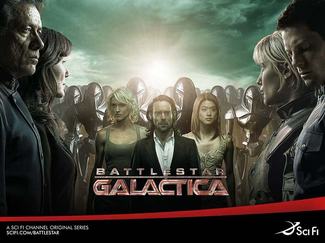« Blowing up the White House | Main | Apropos »
November 11, 2006
Battlestar Galactica - A Measure of Salvation
 When the opening of this episode began with a warning about violent content and mature themes, I knew we were in for more than just the usual violence and adult themes that run through this series.
When the opening of this episode began with a warning about violent content and mature themes, I knew we were in for more than just the usual violence and adult themes that run through this series.
And I wasn't disappointed.
We left the last episode, Torn, with Athena(Sharon) and her co-pilot bugging out of the lion's head nebula where they had discovered a Cylon baseship. This episode opens with Athena's return, along with Apollo and a reconnaissance team. In a scene eerily reminiscent of a deep-sea submersible diving on a shipwreck, the Galactica scout ship gingerly picks its way through dark and drifting Cylon raiders to the baseship. The tension as the team moved through the baseship was palatable, ratcheting up as they discovered dead Cylon skinjobs. We, the audience, know what they've walked into and yet the scene of Athena submerging her hand into the now coagulating goo of the baseship interface and discovering plague still was a white-knuckle moment.
Apollo is more command assertive then he was in the first or second seasons. When the team realizes that some of the Cylons are not dead, and panic threatens to overwhelm, he is able to keep them from firing. However, Apollo has lost something along the way. His character was always the one that struggled with the moral conundrums -- from questioning the use of prisoners as "slave" labor in Bastille Day to taking Roslin's side against his own father to even shooting in cold blood a criminal kingpin in Blackmarket. Yet, we see Apollo, in an epiphany accompanied with cruel laughter, propose using the plague virus (which humans are immune to) as a biological weapon to wipeout the Cylons.
The sounding of moral questions has moved to Helo, who argues persuasively with Roslin not to commit wholesale genocide against another sentient race. An argument Roslin rejects. She is particularly angry with any suggestion by Helo that he have any opinion of Cylon behavior vis a vis the New Caprica occupation (a point of view reflected by Starbuck and Tigh in the last episode). Roslin is clear, Cylons are to be made extinct. Adama will not disobey Roslin's order, but he clearly isn't in agreement with it. Adama has no love of Cylons and, as a warrior, has no problems with waging war effectively against an enemy that has proven its own ruthlessness time and again. Adama is more worried what effect such a draconian choice, with no quarter shown for any possible Athenas that may exist within the Cylon race, will have on humanity.
The value of loyality and responsibility of choice play out in the short, but significant scenes, between Helo and Athena.
The parallel story arc finds Baltar learning that Karma is, indeed, a bitch. He can't talk his way out of his lies and he finds out the hard way where Cylon distrust can lead. We almost have a little cathartic thrill as Baltar suffers, finally, for his sins.
Yet ...
We also root for the Six in Baltar's head helping him cope with the pain he's enduring.
Three seasons in, and still the Cylons remain "a mystery wrapped in a riddle wrapped in an enigma."
UPDATE Jeff Harrell points out it was a neat detail that the Galactica writers didn't "make up" a plague, but used a real disease, carried by rodents, that humans are immune to. Which is cool, because it makes the torturing of Baltar because the Cylons think he "created" the plague all the more irrational.
Technorati: Battlestar Galactica, A Measure of Salvation,Scifi
Posted by Darleen at November 11, 2006 09:33 AM
Comments
As I pointed out on a thread at Garfield Ridge, the overlap between human and Cylon behavior is becoming more marked. Personally, I find this fascinating. Both races are experiencing behavioral and moral change as the result of their interactions, and from dealing with their own consciences.
I wonder if there will be a subtle shift toward the Cylon perspective at some point, if only for a short time, because they seem to be changing the most. They seem to be susceptible to developing human frailties, perhaps because they were designed to emulate humans. Just like the communists, who were also supposed to be an upgrade.
In short, the Cylons may be more interesting.
Posted by: Chris at November 12, 2006 06:04 AM